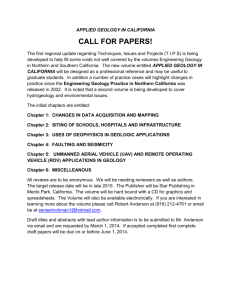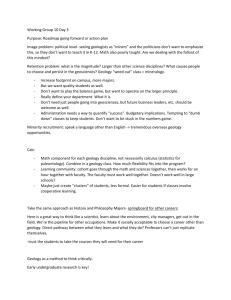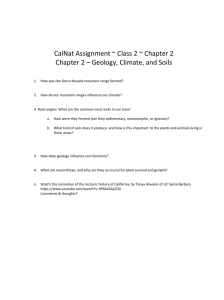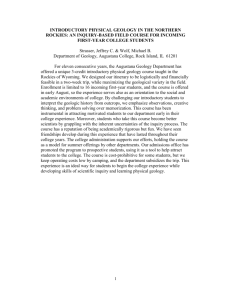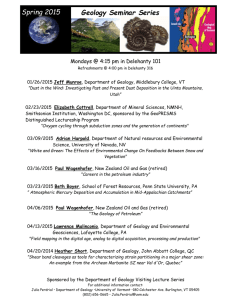Request 3 - Grapevine
advertisement
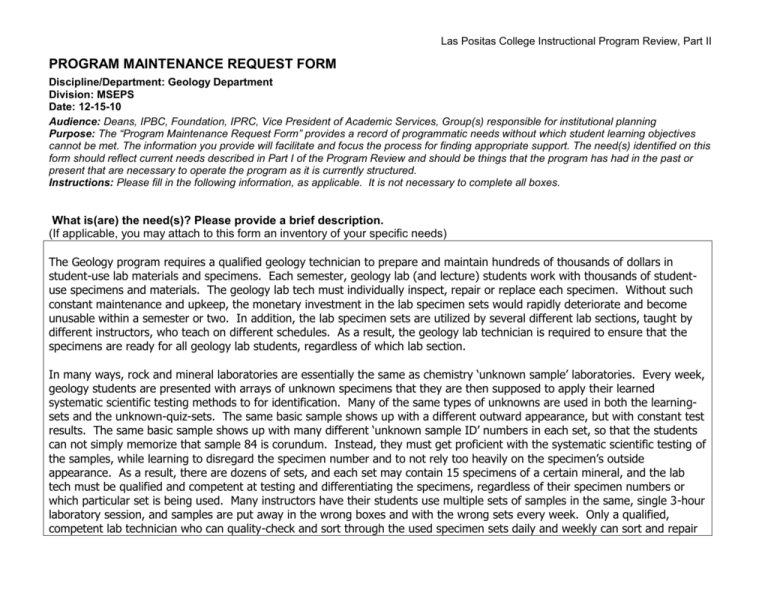
Las Positas College Instructional Program Review, Part II PROGRAM MAINTENANCE REQUEST FORM Discipline/Department: Geology Department Division: MSEPS Date: 12-15-10 Audience: Deans, IPBC, Foundation, IPRC, Vice President of Academic Services, Group(s) responsible for institutional planning Purpose: The “Program Maintenance Request Form” provides a record of programmatic needs without which student learning objectives cannot be met. The information you provide will facilitate and focus the process for finding appropriate support. The need(s) identified on this form should reflect current needs described in Part I of the Program Review and should be things that the program has had in the past or present that are necessary to operate the program as it is currently structured. Instructions: Please fill in the following information, as applicable. It is not necessary to complete all boxes. What is(are) the need(s)? Please provide a brief description. (If applicable, you may attach to this form an inventory of your specific needs) The Geology program requires a qualified geology technician to prepare and maintain hundreds of thousands of dollars in student-use lab materials and specimens. Each semester, geology lab (and lecture) students work with thousands of studentuse specimens and materials. The geology lab tech must individually inspect, repair or replace each specimen. Without such constant maintenance and upkeep, the monetary investment in the lab specimen sets would rapidly deteriorate and become unusable within a semester or two. In addition, the lab specimen sets are utilized by several different lab sections, taught by different instructors, who teach on different schedules. As a result, the geology lab technician is required to ensure that the specimens are ready for all geology lab students, regardless of which lab section. In many ways, rock and mineral laboratories are essentially the same as chemistry ‘unknown sample’ laboratories. Every week, geology students are presented with arrays of unknown specimens that they are then supposed to apply their learned systematic scientific testing methods to for identification. Many of the same types of unknowns are used in both the learningsets and the unknown-quiz-sets. The same basic sample shows up with a different outward appearance, but with constant test results. The same basic sample shows up with many different ‘unknown sample ID’ numbers in each set, so that the students can not simply memorize that sample 84 is corundum. Instead, they must get proficient with the systematic scientific testing of the samples, while learning to disregard the specimen number and to not rely too heavily on the specimen’s outside appearance. As a result, there are dozens of sets, and each set may contain 15 specimens of a certain mineral, and the lab tech must be qualified and competent at testing and differentiating the specimens, regardless of their specimen numbers or which particular set is being used. Many instructors have their students use multiple sets of samples in the same, single 3-hour laboratory session, and samples are put away in the wrong boxes and with the wrong sets every week. Only a qualified, competent lab technician who can quality-check and sort through the used specimen sets daily and weekly can sort and repair Las Positas College Instructional Program Review, Part II and keep the sets in usable status. In addition to specimen preparation, upkeep and maintenance for Geology and Oceanography, the Geotech finds vendors, orders, labels, creates new rock and mineral sets, manages the ordering of program supplies, repairs and laminates maps, plus creates new materials (e.g., 3-D structural geology block models) and art work for student use. The Geology/Oceanography technician also interfaces with other campus technical and support staff, participates in Science Building meetings, maintenance and development, and participates in appropriate campus meetings and interactions. Without a qualified, competent geology lab tech, Geology would become a second-class science at Las Positas, and that would not be appropriate for a program that typically averages above 550 enrollment productivity and runs lab sections along with 45seat lectures. The feedback regarding campuses that do not have geology/oceanography technicians has been that the samples were in terrible, effectively non-usable, condition, and that instructors were resorting to hiding samples from each other as it is not possible to share thousands of specimens between several different sections of lab students without a lab technician sorting and repairing the student-use materials on a daily and weekly basis. In one instance, the non-maintained specimens were no longer usable, and simply sat gathering dust, and no one noticed that water was dripping from one shelf to the next, slowly dissolving from one set and then reprecipitating in a lower set – effectively creating cave formations, with the original, basic functions of the costly specimens not recoverable. The Geology program currently has a qualified Lab Tech ll at 75% time during the ten month school year. There is no coverage in the evening or the summer. In the future, when funds are available, expanded coverage would be appropriate. How will meeting this need benefit student learning? The lab tech is able to ensure that the students are using optimal rock and mineral sets to learn the process of identification. This challenging learning experience would be very frustrating if not impossible with poor quality samples. Students familiar with the lecture format benefit tremendously from having excellent clear geologic and topographic maps, as well as clean, functional microscopes and electronic scales, etc. Students are rewarded for their diligence with accurate results when the materials used are in great condition. Without a competent, qualified geology lab technician, the specimens rapidly fall into disrepair and become unusable as tools for students to learn from. The same applies to the equipment and other lab materials used each semester by students in the Geology and Oceanography lecture and lab sections. Page 2 of 4 Las Positas College Instructional Program Review, Part II As the materials are used by many different sections of labs, with different students and different instructors, it is imperative that a technician oversees and orchestrates the usage of the materials. Without such support, the materials can not be maintained for student usage. Most of the students who take Geology and Oceanography laboratories are non-science majors, and this Geology or Oceanography lab may likely be their one and only exposure to a college science lab course. Most of these non-science majors have preconceived negative attitudes and expectations regarding science and math. If they can take a science lab where the materials reliably test the way that they are supposed to, then the students experience and learn confidence in themselves and their interaction with science and math. On the other hand, if the samples are poorly (or not) maintained, and as a result, the samples are in disrepair and/or the presented materials are not of proper quality, then the already-negative-attitudes that these students have about science and math is reinforced and the students only learn that ‘it’s bogus’ and ‘not worth their time’. Conducting science labs for non-science majors is tremendously challenging, and yet, it can be rewarding if the proper, qualified and competent lab materials and lab support are available. Instructors who know that the materials are not of proper quality (if they are not maintained by qualified support), will tell their students to disregard and ignore and skip basic experiences and content and this will process into the already-negative-attitudes that many non-science majors already have about science. It is crucial that the campus provides qualified, competent technical support so that the students can have a successful laboratory science experience. One where the materials and equipment are reliable and allow the students to test their learning and to have confidence in the results. How will fulfilling this need support the college’s mission, strategic goals/objectives, and/or student learning outcomes? (Address all that apply) Successful learning is the primary result of properly maintained specimens and equipment. Poorly maintained specimens are worse than no specimens, as the students very quickly get discouraged and feel cheated when the presented materials do not behave as they are purported to. Additionally, a qualified lab technician allows for real-time help and problem-solving when things malfunction, which allows for the highest chances that students will be able to successfully complete their required lab objectives within the scheduled time. The students in the Geology and Oceanography courses are representative of the general population of LPC students; that is, they are primarily non-science majors, with a pre-judgement of dislike for science and math. Properly maintained specimens and materials are critical for fostering and engendering student motivation and willingness to work through a laboratory science course. The lab tech is able to take the responsibility to ensure that as many appropriate materials are available, ready, and of the best quality and quantity possible. Sustainability is modeled, for example, when students see lamination used to preserve the working life of the hundreds of Page 3 of 4 Las Positas College Instructional Program Review, Part II geologic and topographic maps used in lab exercises. Will fulfilling this need benefit other areas on campus? If so, how? The Geology lab tech coordinates between Geology and Oceanography instructors, and then coordinates with other lab techs (physics, biology, chemistry, etc), instructors from other programs, campus maintenance and custodial staff, campus and district accounting staff, division staff, campus administrative staff, etc. Providing the ongoing funding for this position has allowed team work when appropriate between the physics lab tech and the geology lab tech. Physical Science as a whole benefits when the full time and part time instructors are supported by competent lab techs. As a Classified staff member the Geology Lab Tech also participates as an active member of the college community, serving on committees and submitting reports on committee meetings to the MSEPS division. Additional information about this need: Geology enrollment productivity is typically above 550, which is excellent for a science program that offers laboratory sections. The following is from the Enrollment Management Committee: Geology Credit FTES Apportionment (08/09): $4,564.83 Average Cost Per FTEF (08/09): $45,000 Total FTEF Cost (08/09): $ 202,500.00 Total FTES Revenue (08/09): $ 376,507.18 Difference: $ 174,007.18 – the Geology program enrollments easily pay for the Geology technician Page 4 of 4
